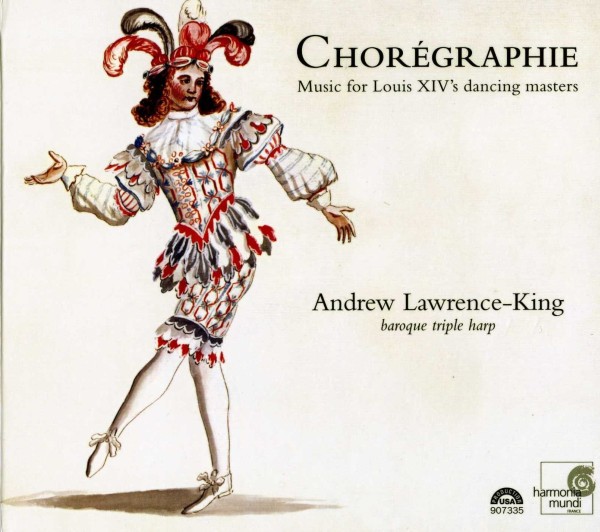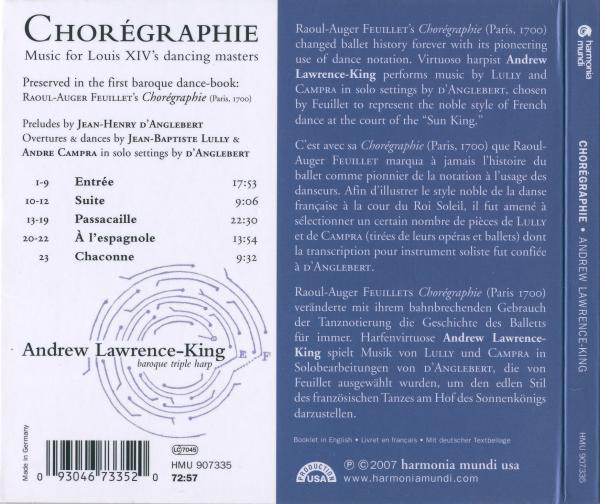
kompozytor
Campra, André;
Lully, Jean-Baptiste;
D'Anglebert, Jean Henri1
tytuł
Choregraphie
wykonawcy
Lawrence-King, Andrew
nr katalogowy
HMU 907335
opis
Nakład wyprzedany, ostatni egzemplarzThis diary entry of Madame de Sévigné shows the enormous role of dance at the court of the Sun King, which the film "The King dances" also presented to today's audience in magnificent pictures. The exact reconstruction of the historical dances for the film was made possible by a book from which Andrew Lawrence-King makes music on the present CD: Raoul-Auger Feuillet's Chorégraphy, published in 1700.
• André Campra: From « L'Europe Galante : Air En Rondeau Gay » - Entrée Espagnole
• Jean-Baptiste Lully: From « Xerxes » - Entrée: Air Pour Les Paysans Et Paysanes: Des Paysans Et Paysanes Chantent Et Dansent A L'Espagnole
• Campra: From « Hésionne » - Le Louvre
• Lully: From « Ballet Du Temps, Ballet Des Plaisirs, Une Nopce De Village, Roland Etc. » - La Mariée De Rollant
• Lully: From « Le Bourgeois Gentilhomme » - Sarabande Pour Une Femme
• Lully: From « Xerxes » - Bourée Pour Les Basques (Transcription By – d'Anglebert)
• Ennemond Gaultier: Chaconne Du Vieux Gautier (Transcription By – d'Anglebert)
• Lully: From « Xerxes, Armide » - La Contredance
Suite• Lully: From « Le Triomphe De L'Amour » - Entrée D'Apollon (Transcription By – d'Anglebert)
• Anonymous, Antoine Pointel: Suite La Bourgogne; Courante - Bourée - Sarabande - Passepied
• Lully: From « Rolland » - Gigues: Gigue A Deux - Gigue Pour Homme
Passacaille• Lully: From « Alceste » - Overture: Le Retour Des Plaisirs
• Marin Mersenne: From « Harmonie Universelle » - Courante: La Bocanes
• Lully: From « Une Nopce De Village » - Sarabande
• Wilhelm Brade: From « Neue Lustige Volten » - La Vignonne
• Lully: From « Pièces De Symphonie, Ballet Des Saisons » - Pavane Des Saisons
• Jean-Henry d'Anglebert: Gaillarde
• Lully: From « Armide » - Passacaille D'Armide (Transcription By – d'Anglebert)
A L'Espagnole • Jean-Henry d'Anglebert: Prélude In D Minor (1689)
• Campra: From « L'Europe Galante » - Entrée Espagnole
• Francesco Corbetta, Marin Marais: Les Folies D'Espagne (Transcription By – d'Anglebert)
Chaconne• Jean-Henry d'Anglebert: From « Amadis » - Chaconne D'Amadis: Les Héros Et Héroïnes Leur Joie Par Des Danses
Louis XIV's passion for ballet and dance determined the evening entertainment three times a week: at six o'clock in the evening, courtly society went to the king's chambers, where violins played for dancing in one of the rooms, as Liselotte of the Palatinate, Louis's sister-in-law, reports. Beyond the king's dancing pleasure, the ballet played an important political role at the court of Versailles. With his great operas and ballets, Jean-Baptiste Lully created the framework for the self-portrayal of the Sun King as the centre of French society. In the ballets, Louis XIV himself often appeared in the role of Apollo or the Sun as a fixed star around which all other planets orbit
We are unusually well informed about the choreography of these ballets, as there are precise choreographic records that go beyond descriptions of these events: For his book Chorégraphie, published in 1700, Raoul-Auger Feuillet developed his own "notation" in which the movements of the dance could be defined more precisely than any description in words. The dance paths of the individual dancers are indicated in space-filling lines by sweeping geometric figures that are oriented towards the "Présence", i.e. the audience in the opera or the king and his noble company. Along these lines, the movement of the feet is notated in "letters", and the musical time is indicated by bar lines that correspond to the melody written above them. Signs for the conventional steps, such as pas de bourrée or contretemps de gavotte, and separate symbols for simple and combined jumps, the pas battus (the folding of the legs in the air) or the transformation of musical ornamentation into a decorative gesture, as well as all the other movements of ballet dance at that time, make Feuillet's book a unique source for posterity on the rules of baroque dance. Thus, today's artists can reconstruct these ballets and show the audience what Soame Jenyns expressed back then with a two-liner: "Art and music must unite in such a way / that notes seem to echo like feet".
Works:
Entrée• Jean-Henry d'Anglebert: Prélude In C
• André Campra: From « L'Europe Galante : Air En Rondeau Gay » - Entrée Espagnole
• Jean-Baptiste Lully: From « Xerxes » - Entrée: Air Pour Les Paysans Et Paysanes: Des Paysans Et Paysanes Chantent Et Dansent A L'Espagnole
• Campra: From « Hésionne » - Le Louvre
• Lully: From « Ballet Du Temps, Ballet Des Plaisirs, Une Nopce De Village, Roland Etc. » - La Mariée De Rollant
• Lully: From « Le Bourgeois Gentilhomme » - Sarabande Pour Une Femme
• Lully: From « Xerxes » - Bourée Pour Les Basques (Transcription By – d'Anglebert)
• Ennemond Gaultier: Chaconne Du Vieux Gautier (Transcription By – d'Anglebert)
• Lully: From « Xerxes, Armide » - La Contredance
Suite• Lully: From « Le Triomphe De L'Amour » - Entrée D'Apollon (Transcription By – d'Anglebert)
• Anonymous, Antoine Pointel: Suite La Bourgogne; Courante - Bourée - Sarabande - Passepied
• Lully: From « Rolland » - Gigues: Gigue A Deux - Gigue Pour Homme
Passacaille• Lully: From « Alceste » - Overture: Le Retour Des Plaisirs
• Marin Mersenne: From « Harmonie Universelle » - Courante: La Bocanes
• Lully: From « Une Nopce De Village » - Sarabande
• Wilhelm Brade: From « Neue Lustige Volten » - La Vignonne
• Lully: From « Pièces De Symphonie, Ballet Des Saisons » - Pavane Des Saisons
• Jean-Henry d'Anglebert: Gaillarde
• Lully: From « Armide » - Passacaille D'Armide (Transcription By – d'Anglebert)
A L'Espagnole • Jean-Henry d'Anglebert: Prélude In D Minor (1689)
• Campra: From « L'Europe Galante » - Entrée Espagnole
• Francesco Corbetta, Marin Marais: Les Folies D'Espagne (Transcription By – d'Anglebert)
Chaconne• Jean-Henry d'Anglebert: From « Amadis » - Chaconne D'Amadis: Les Héros Et Héroïnes Leur Joie Par Des Danses
nośnik
CD
gatunek
Muzyka klasyczna
producent
Harmonia Mundi
data wydania
15-03-2007
EAN / kod kreskowy
093046733520

(Produkt nie został jeszcze oceniony)
cena 99,00 zł
lubProdukt dostepny w niewielkiej ilości.
Wysyłka w ciągu 3 dni roboczych
Darmowa wysyłka dla zamówień powyżej 300 zł!
Darmowy kurier dla zamówień powyżej 500 zł!
sprawdź koszty wysyłki











































